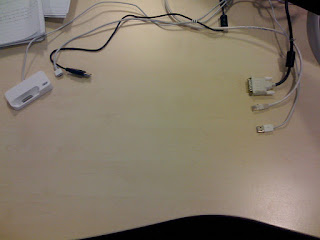 |
| Follow Me, By Ozzy Delaney. CC BY 2.0 |
Recently, I was looking through the list of the 1700(ish) people that I follow on Twitter. As I scrolled, I started to notice some things.
The first person that I followed on Twitter was Chris Betcher. I'm not 100% sure, but I think this came from an IWBNET conference that I attended way back in 2008. I won the place because I had taken part - and done well - in a department-led initiative aimed at giving teachers more ICT skills (I earned my Cert 2 through the course). Chris was one of the speakers at the conference an I must have followed him that day. I've been reading his blog and following his adventures ever since.
Funnily enough, Chris is also my first follower! We're only just now (sort of) doing a little bit of work together, which is probably why I find it interesting.
The next few people I followed were obviously connected to my growing interest in EdTech; but then there are a run of old high school friends. This tells me that I added them some time in 2008-2009, as we were organising our 20 year reunion at the time.
After that, I have a run of entertainers and musicians that I followed. I'm a big Foo Fighters fan, and they toured here in 2008. Then there were all the maths educators that I followed after attending a maths conference in Perth in 2009.
In 2010 I moved into an ACT Government central office role, in the team I'm (back) working in. Twitter reminds me of that because I followed people that we were collaborating with at that time, like Stephen Heppell, Rob Fitzgerald and Chris Smith (as well as my boss!).
There's my first visit to EduTech, back in 2012. That was when I followed people like Alan November, Greg Whitby and Dan Haesler. Not long after that when George Couros visited and spent a day with us and a few teachers and leaders from ACT schools. I followed a few more of my colleagues then too.
I can see my next couple of visits to EduTech; when I started getting really into Lego; and all the accounts I followed after I did my Sh'Bam training with Les Mills. I see academics and higher education accounts that I followed when I first started teaching at the University of Canberra. I can also see when my hubby and I went through a period of binge-watching Breaking Bad (I can tell because I followed Bryan Cranston and Aaron Paul). There's a rush of Canberra-themed accounts from when I took part in Visit Canberra's Human Brochure campaign; and I can pinpoint the moment my journey with Google for Education began.
 |
| Diary Writing by Fredrik Rubensson. CC BY SA 2.0 |
To you, this might look like a bunch of random and trivial events. But to a busy person like me, who moves from one thing to another without a lot of time to document anything, something that sparks a memory is an opportunity for me to reflect and remember. When I noticed these trends in my list, I also remembered the events that went with them; the people I knew then; the other things that were going on in my life. It's not as detailed as it might be if I'd kept a diary, and there's probably lots of stuff I don't remember, but it's still a nice little bit of reminiscing.
All this started with me looking for some specific accounts in my list, but it ended up being a pretty cool insight into the last 8 years of my life. What do you see when you look at your follow list?








